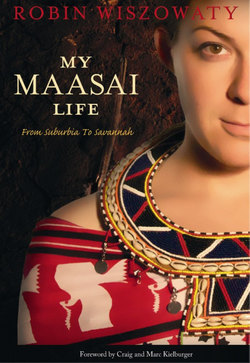Читать книгу My Maasai Life - Robin Wiszowaty - Страница 6
На сайте Литреса книга снята с продажи.
ОглавлениеPrologue
I am squeezed with dozens of other bodies into the back of a rusted, white Toyota pickup truck, bouncing along a dirt road toward the market town of Soko. A long hour’s drive over the eastern slopes of lush and towering hills, it is a trek we make every Saturday to buy the week’s groceries and supplies. On foot, the trip takes four hours along the dusty, arid spine of the hills’ grasslands, then three more back down through the acacia-filled valley. But as one of the earliest passengers on the road this morning, I am lucky enough to stake out a seat on our community pickup truck. As usual, we squish as many people as possible into the truck’s bed, pressed in until no standing room is left, even with many balanced on one foot.
I’m seated in the only available spot in the truck’s bed, above the wheel well. Milk containers roped to an iron bar above thump against my skull with every bump in the road. An old man with long, stretched earlobes crams against me to my right, his wrinkled face and weathered feet telling of his many years of toil in the unyielding sun. To my left, a group of women laugh and talk animatedly in words I understand only occasionally.
The pickup jerks back and forth, bumping down the craggy road, kicking up a breeze of gritty dust. The combined reek of burning oil and close bodies, along with the ailing roar of the truck’s engine, overwhelms me. With I am squeezed with dozens of other bodies into the back of a rusted, white Toyota pickup truck, bouncing along a dirt road toward the market town of Soko. A long hour’s drive over the eastern slopes of lush and towering hills, it is a trek we make every Saturday to buy the week’s groceries and supplies. On foot, the trip takes four hours along the dusty, arid spine of the hills’ grasslands, then three more back down through the acacia-filled valley. But as one of the earliest passengers on the road this morning, I am lucky enough to stake out a seat on our community pickup truck. As usual, we squish as many people as possible into the truck’s bed, pressed in until no standing room is left, even with many balanced on one foot.
I’m seated in the only available spot in the truck’s bed, above the wheel well. Milk containers roped to an iron bar above thump against my skull with every bump in the road. An old man with long, stretched earlobes crams against me to my right, his wrinkled face and weathered feet telling of his many years of toil in the unyielding sun. To my left, a group of women laugh and talk animatedly in words I understand only occasionally.
The pickup jerks back and forth, bumping down the craggy road, kicking up a breeze of gritty dust. The combined reek of burning oil and close bodies, along with the ailing roar of the truck’s engine, overwhelms me. With one hand I reach to steady a small boy as he takes a seat on my lap; with the other, I swat away a chicken pecking at my foot. As the boy burrows further into my arms, I squint into the sun and wind, watching the women’s scarves blow freely in the breeze, waving in bursts of vivid ochre and blue.
I gaze out beyond this scene, at the valley stretching to a hazy horizon, and I ask myself: how did I, an ordinary American girl who grew up arguing with her parents, swimming for her high school team and playing kickball in suburban backyards, end up here?
My story began just a few years ago, but it seems a lifetime away.
